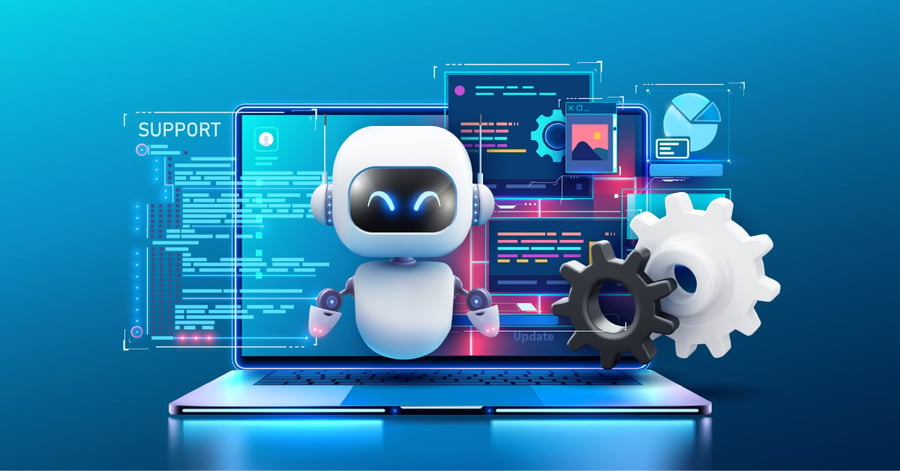
Why Agentic AI Is the Future of ERP Software
Why Agentic AI Is the Future of ERP Software
6:56
Published :

If enterprise software were a relay race, ERP has long held the baton. From automating transactions to managing complex supply chains, ERP systems have powered business performance for decades. But as the volume of data surges and business complexity rises, traditional ERP systems are struggling to keep up.
Welcome to the era where AI ERP software not only automates tasks but thinks, acts, and adapts, redefining the rules of intelligent enterprise management.
At its core, Agentic AI in ERP refers to autonomous AI agents embedded within enterprise systems. Unlike RPA (Robotic Process Automation), which executes static tasks, AI ERP software with agentic capabilities can think, decide, and act based on goals, context, and real-time data. These agents are always on, always learning, and always acting, removing bottlenecks while amplifying human potential.
With the ERP brain (or central controller) coordinating multiple agents, businesses gain an intelligent backbone that enables proactive decision-making across finance, procurement, HR, and supply chain.
The adoption curve is accelerating fast. The AI agents’ market, valued at $3.7 billion in 2023, is projected to exceed $100 billion by 2032, with security emerging as a major growth driver. Moreover, by 2027, AI agents are expected to reduce the time to detect and exploit account exposures by 50% — a crucial advantage in today’s real-time risk environment.
Despite the rise of intelligent ERP platforms and new age ERP innovations, many organizations continue to face challenges such as:
In today’s enterprise environments, complexity isn’t the exception; it’s the norm. Multiple departments, distributed teams, evolving regulations, and rapidly expanding datasets make enterprise operations more dynamic than ever. Even AI ERP software sometimes struggles to make sense of overlapping workflows and external variables without human input. As a result, data-rich organizations are often unable to act quickly or with confidence despite having information at their fingertips.
From finance to supply chain to HR, many ERP processes are still reactionary. When something breaks or even slightly deviates from plan, it takes time and manual effort to identify the root cause, correct it, and get things moving again. Teams spend disproportionate hours troubleshooting ERP-related issues that should have been prevented or self-resolved, leading to repetitive tasks and low-value firefighting.
ERP systems are designed to enforce structure. But when that structure still relies on human coordination, approvals, and execution, errors are inevitable. In fast-moving business environments, delays or missteps caused by manual inputs don’t just slow things down; they introduce financial, operational, and reputational risks.
Despite all their capability, many ERP systems still fall short when it comes to end-to-end execution. Processes that span multiple departments, like order-to-cash or procure-to-pay, frequently get stuck due to dependency on specific individuals or teams. If one person is unavailable or if information is siloed in one function, everything stalls. This not only reduces efficiency but also makes scaling difficult.
Agentic AI in ERP solves these challenges by introducing autonomous, collaborative agents working around the clock. Here's how it transforms enterprise operations:
Each agent is designed to handle a granular business activity, be it checking compliance, predicting stockouts, or validating transactions. These agents continuously scan internal and external environments for anomalies and opportunities.
The core differentiator of Agentic AI in ERP is its cognitive orchestration engine, a “brain” that coordinates multiple agents, assigns tasks, and takes independent actions. This shift elevates ERP from a mere automation system to a true intelligence system. Each agent stays on 24*7 and focuses on the specific granular activity assigned to it.
The key difference between Robotic Process Automation and Agentic AI is the brain of Agentic AI. Unlike RPA, which automates predefined steps, AI ERP software with agentic capabilities takes proactive action to execute tasks. Human input is needed only for exception handling or strategic decisions, freeing up valuable bandwidth.
Agentic AI in ERP can interact not just within systems, but across teams, functions, and even external vendors. This makes execution seamless and real-time, no more email follow-ups or delayed approvals.
Agentic AI in ERP handles routine decisions autonomously, escalating only exceptions, so humans can focus on strategic, high-impact work. This human-in-the-loop approach ensures that expertise is applied where it matters most, while the system maintains speed, accuracy, and consistency across everyday operations.
Let’s apply this to a typical use case: procurement.
In a traditional setup, the ERP system may alert a procurement manager about low inventory. The manager then reviews vendors, checks compliance, compares quotes, and initiates a purchase order—often over days.
With Agentic AI in ERP, one agent tracks inventory in real time, another monitors vendor performance and pricing, while a third ensures compliance and budget alignment. Together, they feed into a central brain that synthesizes inputs and auto-generates the purchase order, streamlining procurement without human intervention. It does not replace humans, but it makes them 10-15x more powerful. It comes back to the human decision-maker only on an exception-basis, that the system is unable to handle. This is how AI ERP software doesn’t just support decision-making, it makes decisions.
The journey of ERP has gone from being a system of record to a system of automation. Now, it's evolving into a system of action and foresight, powered by Agentic AI. This transformation marks the beginning of a new era, where your ERP not only keeps pace with your business but drives it forward intelligently.
For businesses seeking resilience, agility, and scale, AI ERP software is no longer optional. It’s fundamental.
Discover how Ramco’s AI-powered, agentic approach is redefining what’s possible.
Enterprise asset management (EAM) involves the management of mission critical assets of an organization throughout each asset's lifecycle. EAM is used to plan, optimize, execute, and track the needed maintenance activities with the associated priorities, skills, materials, tools, and information. The aim is to optimize the quality and utilization of assets throughout their lifecycle, increase productive uptime and reduce operational costs.
Enterprise asset management (EAM) involves the management of the maintenance of physical assets of an organization throughout each asset's lifecycle. EAM is used to plan, optimize, execute, and track the needed maintenance activities with the associated priorities, skills, materials, tools, and information.
The software helps in effective maintenance of assets through preventive, predictive, shutdown and breakdown maintenance strategies. The system also helps enterprises mitigate equipment risks by enhanced safety standards. The streamlined operations and improved asset performance helps organizations increase their investment effectiveness.
EAM is important because it helps organizations track, assess, manage and optimize asset quality and reliability. Asset intensive Organizations have hundreds, thousands, even millions of assets which needs to be maintained to maximize / optimize life of these assets to increase the return on investment.
The key features of effective EAM are:
Asset Intensive companies under the following Industries :
Contact us for a meeting and schedule a demo
This differs on case to case basis, based on the type of installation and unique industry specific requirements. Contact us for a meeting and schedule a demo.
This differs on case to case basis, based on the type of installation and unique industry specific requirements. Contact us for a meeting and schedule a demo.
Stay Connected, follow us on LinkedIn / Twitter to know more about EAM Software latest trends.

Karthikeyan leads the Product Marketing for Enterprise Digital Solutions at Ramco Systems.He is an astute technology marketer with over 12 years of experience across the spectrum from products to services and product management. He follows technology trends ardently and the impact they have on businesses. He has formulated successful go-to-market strategies for manufacturing and other asset-intensive sectors – the likes of automotive, textiles, cement and heavy industries. Outside of work, you can catch him spending time playing Tennis, Badminton and going on Road Trips.

All Rights Reserved. © Copyright 2024. Ramco Systems.